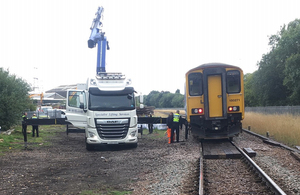British High Commission Webinar: Strengthening capital markets to spur business growth and job creation in Bangladesh
On 15 September the British High Commission in Bangladesh organised a webinar titled “Bangladesh Capital Markets: A New Frontier”. Mr M A Mannan, the honourable Minister of Ministry of Planning, Government of Bangladesh, attended as the Chief Guest. He was joined by Ms Rushanara Ali, Member of the UK Parliament and the UK Prime Minister’s Trade Envoy for Bangladesh.
The webinar was attended by senior government officials and representatives from private and public sector organisations including: Sultana Afroz, Secretary and CEO, Public Private Partnership Authority (PPPA), Prime Minister’s Office (PMO), Professor Shibli Rubayat Ul Islam, Chairman, Bangladesh Securities and Exchange Commission (BSEC), Md Mahbubur Rahman, CEO, HSBC Bangladesh, Mr Naser Ezaz Bijoy, CEO, Standard Chartered Bank Bangladesh, Mr Henry Tillman, Chairman, Grisons Peak Services, Mr Ifty Islam, Chairman, Asian Tiger Capital, Mr Fahim Ahmed, President, Pathao, Mr Srini Nagarajan, Managing Director and Head of Asia, CDC, Mr Nishant Kumar, Managing Director for Asia, GuarantCo, Ms Fiona Stewart, Lead Financial Sector Specialist, World Bank, Ms Nuzhat Anwar, Acting Country Manager, Bangladesh, Bhutan, and Nepal, IFC, and Tarique Amin Bhuiyan, Managing Director, Dhaka Stock Exchange.
British High Commissioner to Bangladesh Mr Robert Chatterton Dickson delivered the welcome remarks. Deputy British High Commissioner Mr Javed Patel and Development Director Ms Judith Herbertson moderated different sessions.
The webinar explored the functioning of Bangladesh’s capital markets and looked at how capital market reform and financial sector modernisation in partnership with the UK can support increased private sector investment and help Bangladesh achieve sustained economic growth as it enters its next 50 years.
The UK Prime Minister’s Trade Envoy for Bangladesh Ms Rushanara Ali MP congratulated Bangladesh on its 50 years of independence and applauded the economic goals Bangladesh has set to reach Upper Middle-Income Country by 2031 and a High-Income Country by 2041.
Ms Rushanara Ali MP said
“A strong and modern UK-Bangladesh financial sector partnership has potential for mutual benefits. The basic ingredients already exist: Bangladeshi banks are present in UK and British financial services companies like, HSBC and Standard Chartered Bank, operate in Bangladesh. Others, including insurance companies, are exploring the market.”
The webinar highlighted the need for broadening and deepening Bangladeshi capital markets and the opportunities for investors and issuers that reforms could bring. Participants shared insights on the role of regulators, the important role pension funds and institutional investors could play, the private equity and start up ecosystem, and the current state of the mergers and acquisition market. The discussion demonstrated how well the Bangladesh economy is performing relative to its neighbours and how best it can build on that success and improve its attractiveness to investors.
Md Mahbubur Rahman, CEO, HSBC Bangladesh, said
“Despite challenges, Bangladesh’s economy has proved to be resilient with consistent high growth in the last decade and growth volatility below regional average. With constraints to investment by public and private sector like power and infrastructure gradually being addressed, Bangladesh has momentum in its favour as the country graduates from Least Developed Country to a Developing country in 2026.”
Mr. Naser Ezaz Bijoy, CEO of Standard Chartered Bank Bangladesh, said
“Bangladesh is getting ripe for Mergers & Acquisitions (M&A) activities on the back of a probable post-pandemic K-Shaped economic recovery, consolidation of market players, and significant unrealised potential of the country. However, the scope of M&A activities is much wider than sale of distressed assets, and can enable both private and public sector companies to unlock the greater value for themselves and their clients.”
Ms. Nuzhat Anwar, Acting Country Manager, Bangladesh, Bhutan and Nepal, International Finance Corporation (IFC), said
“Well-developed domestic capital markets can be key to building more resilient financial systems – systems that better mobilize local currency finance from domestic and foreign investors and connect them to investments.”
Mr Srini Nagarajan, Head of Asia for CDC, the UK’s development finance institution, said
“Bangladesh is one of the fastest growing economies in the world, and we believe it could emerge as one of the strongest economies in the South Asia region. Since 2020, it has increased its market capitalisation by over a third. The opportunities for investors and businesses are abundant, and a greater coordination between institutional investors, regulators, entrepreneurs and corporates, and banks will further support capital market development in Bangladesh.”
British High Commissioner to Bangladesh Robert Chatterton Dickson highlighted the role the City of London can play in helping to bridge the investment needs of Bangladesh’s private sector.
Robert Chatterton Dickson said
“Private capital investment in business and infrastructure will play an increasing role in powering the next stage of Bangladesh’s growth after Least Developed Country graduation. Developing new channels of investment finance, both domestic and international, will spur business growth and job creation.
“The City of London, as a preeminent global financial centre and home to some of the world’s deepest and most sophisticated international capital markets, can play an important part in providing Bangladesh’s government and private sector with a gateway to capital markets and investors. This meeting brings together experts, investors and practitioners to consider the next steps in maximising these opportunities.”
Note to editor
FCDO actively supports financial sector development and increased investment by the private sector in Bangladesh through its programmes. For example, Business Finance for the Poor in Bangladesh (BFPB) is a £24.8m programme, implementing between 2014 and 2023. It supports improved access to financial services, including credit, for micro, small and medium enterprises (MSMEs) to improve income, jobs and livelihood opportunities for poor men and women in Bangladesh. Bangladesh Investment Climate Fund 2 (BICF2) is a £18.5m programme, implementing from 2016 to 2022. It supports improvement in business climate to harness private sector investment in job creation and poverty reduction. It provides knowledge, technical training and advisory support to help the Bangladesh Investment Development Authority (BIDA) and the Bangladesh Economic Zones Authority (BEZA), address policy, regulatory and administrative constraints on private investment.
Further information
British High Commission Dhaka
United Nations Road
Baridhara
Dhaka – 1212
Bangladesh
Email: Dhaka.Press@fco.gov.uk
Follow the British High Commissioner to Bangladesh on Twitter: @RCDicksonUK
Follow the British High Commission Dhaka on Twitter, Facebook, Instagram and Linkedin

